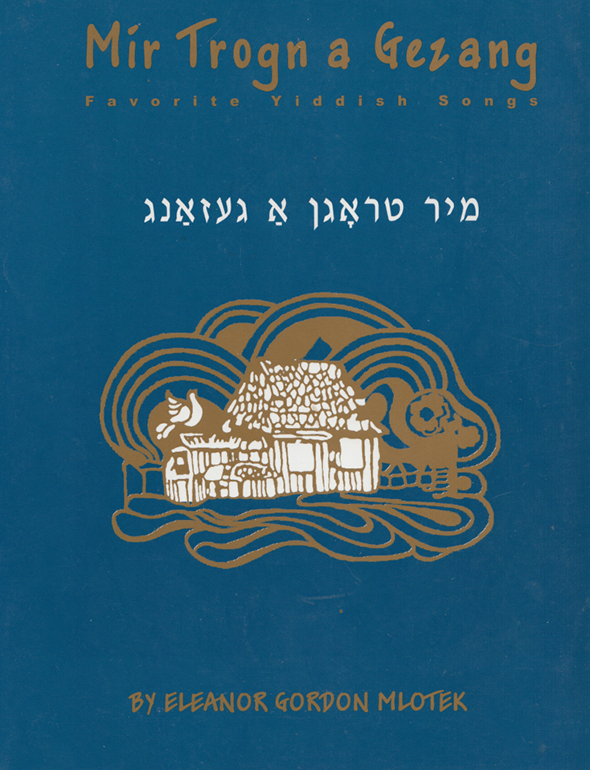Most frequently called Oyfn Pripetshik, from its opening words, this song, originally titled “Der Alef-Beyz,” had gained such wide popularity that many did not realize its authorship. It was written by Mark M. Warshawsky (1840-1907), a discovery of Sholom Aleichem, who assisted in the publication of two collections of Warshawsky’s songs, in 1901 and 1914.
The music was later used as a theme in the film based on the life of George Gershwin. During the Nazi holocaust it was used as a ghetto song: “At the ghetto wall a fire burns, the surveillance is keen.” And in the Soviet Union, in the early ’60’s, a song that made the rounds clandestinely had the following words: “Even should they beat you or throw you on the pyre, repeat komets-alef-o. ”
From David Forman, the English translator: *”In the oven” A pripetshik is part of a large stone or masonry oven used for cooking but also for heating, often with an extended area where one could sit or even lie to warm oneself.
Komets-alef. Alef, א , is the first letter of the Jewish alphabet. The komets is a vowel sign beneath the letter, אָ , indicating that (in Yiddish, as in Ashkenazi Hebrew) it is pronounced, ‘o’.

A fire burns in the oven*
and the room is warm
and the teacher is teaching little children
the alphabet.
Refrain:
Look, children; remember, dear ones
what you are learning here,
Say it again and again,
komets-alef, ‘o’.
Study eagerly, children,
I promise you this,
the one of you who understands Hebrew fastest
will get a flag.
Children, when you will grow older
you will understand
how many tears are contained in these letters,
and how much weeping.
Children, when you bear the burden of exile
and are completely worn out,
may you draw strength from these letters.
Look to them!
Oyfn pripetshik brent a fayerl,
Un in shtub iz heys.
Un der rebe lernt kleyne kinderlekh
Dem alef-beyz.
Refrain:
Zet zhe, kinderlekh, gedenkt zhe, tayere,
Vos ir lernt do,
Zogt zhe nokh a mol un take nokh a mol:
Komets-alef: o!
Lernt, kinder, mit groys kheyshek,
Azoy zog ikh aykh on,
Ver s’vet gikher fun aykh kenen ivre,
Der bakumt a fon.
Az ir vet, kinder, elter vern,
Vet ir aleyn farshteyn,
Vifl in di oysyes lign trern,
Un vi fil geveyn.
Az ir vet, kinder, dem goles shlepn,
Oysgemutshet zayn,
Zolt ir fun di oysyes koyekh shepn,
Kukt in zey arayn!
אױפֿן פּריפּעטשיק ברענט אַ פֿײַערל,
און אין שטוב איז הײס.
און דער רבי לערנט קלײנע קינדערלעך
דעם אַלף-בית.
רעפֿרײן:
זעט זשע, קינדערלעך, געדענקט זשע, טײַערע,
װאָס איר לערנט דאָ,
זאָגט זשע נאָך אַ מאָל און טאַקע נאַך אַ מאָל:
קמץ-אַלף: אַ!
לערנט, קינדער, מיט גרױם חשק,
אַזױ זאָג איך אײַך אָן,
װער ס’װעט גיכער פֿון אײַך קענען עבֿרי,
דער באַקומט אַ פֿאַן.
אַז איר וועט, קינדער, עלטער ווערן,
װעט איר אַלײן פֿאַרשטײן,
װפֿל אין די אותיות ליגן טרערן,
און וױ פֿיל געװײן.
אַז איר װעט, קינדער, דעם גלות שלעפּן,
אױסגעמוטשעט זײַן,
זאָלט איר פֿון די אותיות כּוח שעפּן,
קוקט אין זײ אַרײַן!
Song Title: Oyfn Pripetshik

First published in 1972, Mir Trogn A Gezang: Favorite Yiddish Songs was reprinted six more times (in 1977, 1982, 1985, 1987, 1988, 2000) due to popular demand. The songs in this anthology represent a sampling of beloved folk and well-known Yiddish songs, many of which are scattered in various song collections; some appear in very rare and inaccessible collections; and some were never before published. Folk songs comprise about a third of this volume and were selected mainly on the basis of popularity and sometimes for their historic significance. Needless to say, they are only representative of the vast, rich treasure of Yiddish folk material. The selection was made not only on the basis of personal preference, but in the knowledge they are favorites of many who sing these songs. Most of the songs represent the repertoire that was sung at Yiddish summer camps, May 1st demonstrations and at social gatherings. Many songs were introduced to American Jewry by Jewish immigrants who came to the United States after World War II, for whom these songs had been favorites in Poland and other East European communities destroyed by the Nazis.